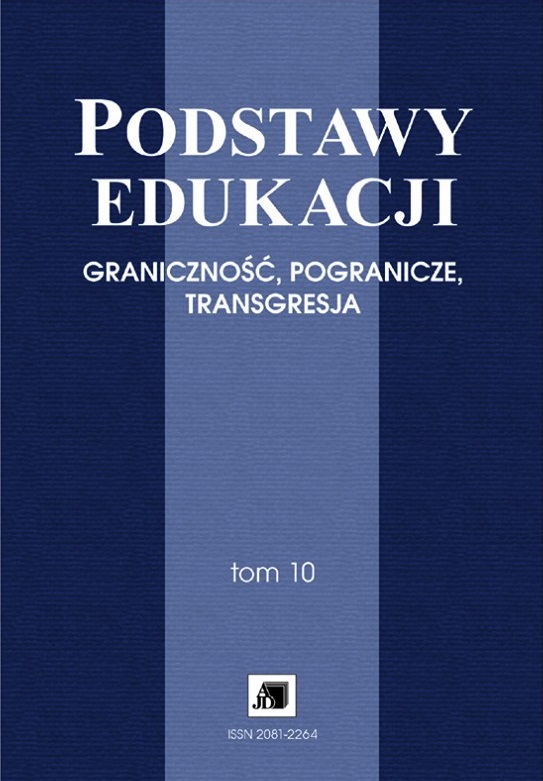Abstrakt
Artykuł przedstawia transhumanizm jako nowe oblicze religijnego wychowania, które całkowicie odrzuca chrześcijańską koncepcję ludzkości poprzez faworyzowanie transcendentalnego i transgresyjnego pojęcia ludzkiej egzystencji. Na początku postaram się przedstawić transcendencję i transgresję jako dwa diametralnie przeciwne światopoglądy. Następnie omówię różne transhumanistyczne podejścia do duchowości i religii. Na koniec pokażę transgresyjny wpływ transhumanizmu w odniesieniu do filozofii Georges’a Bataille’a. Artykuł będzie argumentował tezę, że transhumanizm ma na celu realizację idei suwerennej, amoralnej i ateistycznej jednostki, której duchowość opiera się na koncepcji przezwyciężenia antropologicznych ograniczeń ludzkości. Z pedagogicznego punktu widzenia transhumanizm głosi postawę egzystencjalną, która całkowicie zrzeka się ontologicznej różnicy między sacrum a profanum.
Bibliografia
Bataille, G. (2002). Część przeklęta oraz Ekonomia na miarę wszechświata. Granice użytecznego. Tłum. K. Jarosz. Warszawa: Wydawnictwo KR.
Bataille, G. (1998). Doświadczenie wewnętrzne. Tłum. O. Hedemann. Warszawa: Wydawnictwo KR.
Bataille, G. (1999). Erotyzm. Tłum. M. Ochab. Gdańsk: słowo/obraz terytoria.
Becker, P. von (2015). Der neue Glaube an die Unsterblichkeit. Transhumanismus, Biotechnik und digitaler Kapitalismus. Wien: Passagen Verlag.
Bostrom, N. (2003). The Transhumanist FAQ: A General Introduction. Version 2.1 (2003), World Transhumanist Association. Oxford: http://www. nickbostrom.com/views/transhumanist.pdf [dostęp: 3.08.2017].
Brooke, J.H. (2005). Visions of Perfectibility. Journal of Evolution and Technology, 14(2), 1–12.
Campbell, H., Walker, M. (2005). Religion and Transhumanism: Introducing a Conversation. Journal of Evolution and Technology, 14(2), I–XIV.
Foucault, M. (1984). Przedmowa do transgresji. Tłum. T. Komendant. W: M. Janion, S. Rosiek (red.), Osoby. Gdańsk: Wydawnictwo Morskie.
Guja, J. (2009). Główne problemy filozoficznej krytyki religii, Studia Humanistyczne, 1, s. 133–146.
Habermas, J. (2007). Filozoficzny dyskurs nowoczesności. Tłum. M. Łukasiewicz. Kraków: Universitas.
Heidegger, M. (1997). Powiedzenie Nietzschego „Bóg umarł”. W: tegoż, Drogi lasu. Tłum. J. Gierasimiuk. Warszawa: Fundacja Aletheia.
Henke, D. (1981). Gott und Grammatik: Nietzsches Kritik der Religion. Pfullingen: Günther Neske.
Hopkins, P.D. (2005). Transcending the Animal: How Transhumanism and Religion Are and Are Not Alike. Journal of Evolution and Technology, 14(2), 13–28.
Hughes, J. (2004). Citizen Cyborg. Why Democratic Societies Must Respond to the Redesigned Human of the Future. Basic Books: Cambridge.
Klichowski, M. (2014). Narodziny cyborgizacji. Nowa eugenika, transhumanizm i zmierzch edukacji. Poznań: Wydawnictwo Naukowe UAM.
Klossowski, P. (1998). Msza Georges’a Bataille’a. Przeł. K. Matuszewski. W: G. Bataille, Ksiądz C. Przeł. K. Jarosz. Oprac. K. Matuszewski. Warszawa: KR.
Kwiatkowski, F. (2016). “Let Us Make ROBOT in Our Image, According to Our Likeness”. An Examination of Robots in Several Science Fiction Films through the Christian Concept of the “Image of God”. Studia Religiologica, 49(3), 219–230; http://dx.doi.org/10.4467/20844077SR.16.015.5873.
Marek, Z. (2015). Duchowość, religia i wychowanie. Pedagogika Społeczna, 1(55), s. 9–22.
Milerski, B. (2010). Pedagogika religii. W: B. Śliwerski (red.), Pedagogika. T. 4: Subdyscypliny i dziedziny wiedzy o edukacji. Gdańsk: Gdańskie Wydawnictwo Pedagogiczne.
More, M. (1990). Transhumanism: Towards a futurist philosophy, Extropy, 6, 6–11: http://fennetic.net/irc/extropy/ext6.pdf [dostęp: 3.08.2017].
Motyl, K. (2015). Szkoła na krawędzi chaosu. Projekt możliwy? Podstawy Edukacji. Między porządkiem a chaosem, 8, 131–140.
Nahm, T. (2013). Transhumanismus: Die letzte große Erzählung. W: M.J. Sun, A. Kabus (red.), Reader zum Transhumanismus. Norderstedt: Books on Demand.
Nietzsche, F. (2006). Wiedza radosna. Tłum L. Staff. Kraków: Zielona Sowa.
Ogrodnik, B. (2004). Transcendencja. W: J. Hartman (red.), Słownik filozofii. Kraków: Zielona Sowa.
Otto, R. (1999). Świętość. Elementy irracjonalne w pojęciu bóstwa i ich stosunek do elementów racjonalnych. Tłum. B. Kupis. Warszawa: Wydawnictwo KR.
Pieronkiewicz, B. (2014). Koncepcja kształcenia transgresyjnego oraz teoria dezintegracji pozytywnej jako odpowiedź na specjalne potrzeby edukacyjne współczesnej młodzieży. Podstawy Edukacji, 7, 167–184.
Ramsey, P. (1961). Preface. W: G. Vahanian, The Death of God: The Culture of Our Post-Christian Era. New York: George Braziller.
Sorgner, S.L. (2009). Nietzsche, the Overhuman, and Transhumanism. Journal of Evolution and Technology, 20(1), 29–42.
Sorgner S.L. (2015). The Future of Education: Genetic Enhancement and Metahumanities. Journal of Evolution and Technology, 25(1), 31–48.
Sowa-Behtane, E. (2015). Młodzież ponowoczesna. Kraków: WAM.
Steinhart, E. (2008). Teilhard de Chardin and Transhumanism. Journal of Evolution and Technology, 20(1), 1–22.
Śliwerski, B. (2010). Teoretyczne i empiryczne podstawy samowychowania. Kraków: Impuls.
Tipler, F. (1997). The Physics of Immortality: Modern Cosmology, God and the Resurrection of the Dead. New York: Anchor Books.
Wadowski, J. (2010). Między transhumanizmem a transpersonalizmem. Neoczłowieczeństwo w globalnym świecie? W: H. Romanowska-Łakomy (red.), Esencja człowieczeństwa. Prawda ludzka a cywilizacja. Warszawa: Eneteia.
Wysocki, A. (2015). Transcendencja w ujęciu Margaret Archer. Uniwersyteckie Czasopismo Socjologiczne, 10(1), 130–153.
Zachariasz, A.L. (2011). Człowiek jako byt poszukujący sensu swego bycia w istnieniu. W: A.L. Zachariasz (red.), Człowiek i jego pojęcie. Rzeszów: Uniwersytet Rzeszowski.
Mam świadomość, że czasopismo jest wydawane na licencji Creative Commons - Uznanie autorstwa (https://creativecommons.org/licenses/by/4.0/legalcode).
Przesyłając artykuł wyrażam zgodę na jego udostępnienie na tej licencji.

